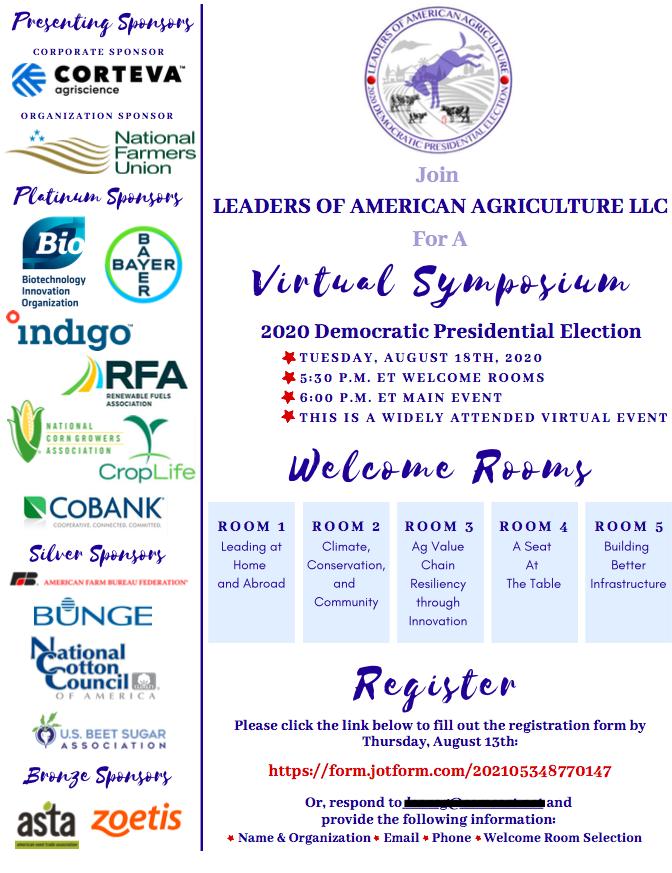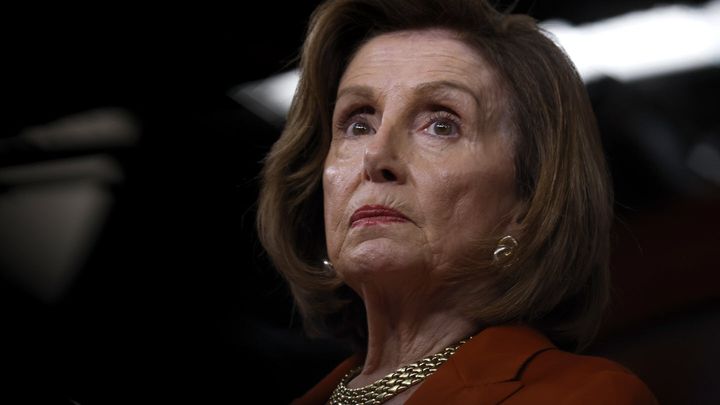The American Prospect is a nonprofit, independent magazine covering public policy and politics. Sludge is re-publishing this article.
Political conventions traditionally feature an orgy of corporate lobbyists and big money courting public officials. You’d think such displays wouldn’t factor into a convention-at-home setup in 2020. After all, where would the lobbyists and hangers-on congregate? The answer is, apparently, on Zoom.
An invite obtained by the Prospect from “Leaders of American Agriculture, LLC” touts a virtual symposium on Tuesday night, with “welcome rooms” about such topics as “Ag Value Chain Resiliency Through Innovation.” The sponsors of this event include two major farm lobbying organizations (the National Farmers Union and the American Farm Bureau Federation); trade groups representing biotech, ethanol, agrochemicals, corn, cotton, beet sugar, and seeds; AgTech company Indigo; farm lender CoBank; animal health company Zoetis; soybean agribusiness Bunge; and seed giants Corteva (formed through the merger of Dow and DuPont) and Bayer, which merged with Monsanto in 2018.

This gala is a perennial at the Democratic National Convention, bringing together “Democratic agricultural leaders” and the corporate interests that fund their campaigns. Philip Karsting, a former administrator of the Foreign Agricultural Service under President Obama, sent out the invite. He’s now a K Street lobbyist with Olsson Frank Weeda Terman Matz. And he’s the co-chair of Joe Biden’s rural advisory committee. The other co-chair has yet to be filled.
Biden’s rural advisers, with deep ties to corporate agriculture, have advocates for family farmers concerned. They cite in particular the influence of former Agriculture Secretary Tom Vilsack, now a lobbyist for the dairy industry, and former North Dakota Sen. Heidi Heitkamp, whose new organization One Country claims to speak for rural America. “The Biden team has too few voices in their ear claiming to represent rural and ag issues,” says Joe Maxwell, president of Family Farm Action and a leading critic of Big Ag monopolies.
At the heart of the dispute is a conception of how to revitalize rural America. Business-friendly ag advisers emphasize trade, believing that promoting overseas markets will translate to prosperity for family farmers and ranchers. But “farmers do not export, Cargill exports,” Maxwell counters, arguing that Big Ag domination is a far greater challenge. If you don’t profit from what you produce, he reasons, more trade won’t fix the problem.
Export strategies force farmers into monoculture crops and overproduction, which pushes down prices. Add to that increasing input costs for seed and machinery and you squeeze working farmers, who must compete with industrial-sized Big Ag operations. Small livestock producers are forced to sell low to concentrated meatpackers and watch as they pass on inflated prices to groceries, enjoying the middleman profits. “The big guys won’t process for the little guys and are putting the little guy out of business,” says Carrie Balkcom, executive director of the American Grassfed Association and a family rancher in South Florida.
Standing up against farmer abuse from ag monopolies would be popular in battleground Midwest states with farm districts, like Minnesota, Wisconsin, Michigan, and Iowa, and advocates for a prairie populist strategy are armed with polling that says so. One poll shows that over 80 percent of rural voters reject ag monopolies and factory farms. The Biden team, by toeing the corporate ag line, is “leaving votes on the table that perhaps they shouldn’t,” Maxwell says.
Farmers are increasingly desperate to deliver this message. “We’ve pleaded for years and years that the farmers are being screwed and our independence is being ripped away from us,” says Chris Petersen, a specialty hog farmer in Clear Lake, Iowa. “You can talk to Vilsack and Heitkamp all you want, but more corporate control of ag is not the answer.”
The Biden campaign has not yet responded to a request for comment.
PRESIDENT TRUMP HAS tried to lump in farmers with his “forgotten men and women” rhetoric, but his policies have pounded rural communities. Years of trade wars slowed exports and left meat and produce frozen in storage. Farm bailouts intended to counteract this damage increasingly flowed to the top. Over half of the money went to the richest 10 percent of farmers, according to a study from the Environmental Working Group, with the bottom 80 percent getting on average just $5,000. Assistance for corn growers was an insulting penny per bushel. JBS, the Brazilian meatpacker and one of the largest companies for beef and pork, received $78 million. A more recent bailout to cope with the effects of the coronavirus crisis was similarly tilted toward the top.
The biggest blow in the Trump years came when the U.S. Department of Agriculture (USDA) rolled back rules that would have banned Big Ag retaliation against small farmers and given them stronger legal tools to prevent abuse. USDA chief Sonny Perdue, himself tied to chicken industry interests, then dissolved the agency that protects small farms, known as the Grain Inspection, Packers and Stockyards Administration (GIPSA), folding it into a PR division called the Agricultural Marketing Service. Perdue wrote the epitaph for the family farmer when he said at a dairy expo last year, “In America the big get bigger and the small go out.”
That accurately describes agriculture today. The top four hog firms control two-thirds of the market; the top four cattle firms, 85 percent. Ninety percent of all chickens are raised through the brutal “tournament” system, where farmers are pitted against one another. Producers specify how farmers must house, feed, and care for chicks, and the fattest ones get sold; farmers that lose the tournament get nothing. Seeds and dairy producers and farm machinery and farm credit companies are all concentrated, as are cafeteria services and grocery stores on the food distribution side. Monopolists have grabbed a significant share of food profits. Farmers used to earn 37 cents of every retail dollar; now it’s down to 15.
“Iowa more and more is an outside service center for corporations,” says hog farmer Chris Petersen. “We’re being mined to make Big Money more big money.”
The Trump administration’s failure in rural America provides Biden an opportunity to present a message of fairness against powerful interests. According to polling taken this spring by Change Research, a whopping 80 percent of rural voters believed that “political elites impose their will on my life,” and would be more likely to vote for someone who supported breaking up the “handful of corporate monopolies now run[ning] our entire food system.” An anti-corruption, anti–big business message that protected family farms would play well in this region.
The Obama-Biden rural plan gestured toward this strategy, to some success. Its platform was notably aggressive on preventing anti-competitive behavior, and won states like Iowa, Ohio, Indiana, and North Carolina, with better-than-expected rural numbers. “I thought Obama would be the next Teddy Roosevelt,” says Mike Callicrate, a cattle rancher in St. Francis, Kansas, for nearly 50 years.
After the election, Obama’s USDA (under Vilsack’s control) and the Justice Department set out on a five-city listening tour of farm country, hearing stories about Big Ag price discrimination, abuse of market power, and intimidation. Farmers who spoke out risked retaliation from big producers who could crush them. But after the hearings, no enforcement actions were taken, more mergers were approved, and GIPSA rules were delayed and ultimately weakened. Obama’s team dubiously asserted that their hands were tied by the antitrust laws.
“He did nothing, and Vilsack did nothing and the Department of Justice did nothing,” says Callicrate. “They totally betrayed us.” This created a lack of trust that has now spread to both parties. If Biden broke with this past and brought in new advisers with a commitment to protecting family farms, that trust could begin to be rebuilt. But instead, the Biden team has returned to the same old corporate-ag well.
AFTER LOSING SENATE races decisively in red states in 2018, Heitkamp and Indiana’s Joe Donnelly started the One Country Project, a dark-money group dedicated to winning back rural voters. It starts from the shaky premise that two senators who were trounced in rural America hold the key to unlocking the region. That One Country’s website was registered by a corporate lobbying firm doesn’t add confidence either.
One Country’s issue guide has some decent material on increasing health access, stopping climate change, protecting the Postal Service, and building rural broadband. But on farm policy, it leads with the need to “open markets and make it easier for farmers to make a good living,” neglecting how Big Ag intercepts trade revenues and impoverishes family farmers. During the COVID-19 crisis, meat companies have been exporting in record numbers, while blaming shortages for rising grocery prices and cutting payments to farmers and ranchers to the bone. An export-driven strategy, in other words, has only led to outsized profit margins for industry giants.
There’s nothing in One Country’s materials about corporate concentration and monopoly power. “It’s a mystery to me what they’re up to,” says Chris Petersen, who is active in Iowa politics and has spoken directly to Biden and vice-presidential nominee Kamala Harris in the past. “With who Heidi Heitkamp is, with the corporate hat on, it doesn’t look good.”
Heitkamp’s fingerprints are all over Biden’s rural policy. She endorsed Biden before the North Dakota primary in March, and has led rural voter events for the campaign. Liberty Schneider, Heitkamp’s campaign manager in 2018, became the Democratic National Committee’s director of rural outreach and engagement last year. According to trade publication Agri-pulse, One Country is working to help Biden and Democratic congressional campaigns with rural outreach. Biden has openly praised Heitkamp, and behind the scenes, he has floated Heitkamp as a leading choice to run USDA, sources tell the Prospect. In this sense, One Country looks like a vehicle for a Cabinet appointment.
“The track record of Heitkamp was not one that understood the importance of certain issues to family farmers and ranchers,” says Maxwell, of Family Farm Action. He noted that Heitkamp was the top Senate recipient of funds from the crop production industry in the 2018 cycle, with over $247,000, and she received money from meatpacking giant Smithfield Foods and its Chinese-owned parent company WH Group. In 2018, Heitkamp voted against an amendment to the farm bill that would have added transparency to “checkoff” programs intended for agricultural marketing, which have become slush funds for lobbying organizations, used in campaigns that hurt family farmers.
Tom Vilsack has also been one of Biden’s top advisers on ag policy, touring Iowa with the former vice president before the caucuses. He also served on the DNC platform committee, crafting the language on rural issues. “The track record of Tom Vilsack is abysmal when it comes to independent family agriculture,” says Maxwell. In addition to his role disappointing farmers while at USDA, critics point to him taking a job as president and CEO of the U.S. Dairy Export Council just days after the end of Obama’s term.
The council’s members include large corporate dairy interests, which have dominated the industry and destroyed family farms. About 4,600 dairy farms have closed every year, with some dairy companies now including a list of suicide prevention hotlines in their envelopes with farmers’ checks.
Vilsack’s advice, like Heitkamp and One Country, promotes exports as a strategy for farm country renewal. “He is owned lock, stock, and barrel by Wall Street and the packers and the food companies,” says Kansas cattle farmer Mike Callicrate.
This is the fork in the road available to Biden: Break with corporate agriculture and drum up support in communities ground down by monopoly power, or maintain the corporate-ag model.
The 2020 platform and Biden’s rural policy are more muted on ag monopolies than those under Obama-Biden in 2008. They do promise to review mergers in agribusiness and “strengthen enforcement” of existing antitrust laws. And both have decent language on expanding domestic markets through regional food systems and promoting sustainable and regenerative practices. Biden campaign surrogates have highlighted his plans to support Black farmers and reverse discrimination, while using agriculture as a spur to fight climate change.
Maxwell thinks that the platform language should be stronger, returning to the initial intent of the Packers and Stockyards Act, with stiff penalties for monopoly abuse of family farmers and ranchers. But the real problem, he explains, is that Vilsack, “the person that candidate Biden is listening to, has an eight-year commitment of not living up to those issues.”
Cattle rancher Carrie Balkcom echoes this concern. “We’re not going to get anywhere as long as they are the voices in Washington,” she says. “They’re representing the big people that keep the little people trapped. I’ve been kicking the door in for 20-some years. We’ve got to be at the table.”
ALL OF THE FARMERS interviewed for this article thought the post-coronavirus moment was perfect for a message of shorter supply chains and local processing. Petersen says his Berkshire Gold non-confinement pork has six-month waiting lists. Balkcom adds that family farmers are seeing upticks in sales. Whether because of worker abuse in meatpacking plants or high grocery prices, a light bulb has gone off that supporting family farmers makes moral and economic sense.
It’s also a bridge to a more equal America. “If you could have things processed locally, you bring back those economies, supporting the local hardware store and local schools, and money stays in the community,” says Carrie Balkcom. In her hometown in South Florida, there are three dollar stores and no grocery for fresh foods. “We’ve become part of a secondhand economy,” adds Mike Callicrate. “Farmers are eating out of dollar stores, they can’t even get good food.”
This is the fork in the road available to Biden: Break with corporate agriculture and drum up support in communities ground down by monopoly power, or maintain the corporate-ag model, and continue the decades-long Democratic trend of bleeding support outside big cities. “These issues are well known to rural America,” Maxwell says. “You don’t have to convince them that corporate concentration and monopolies are bad for them. They live through it every day.”
A lot of anti-monopoly work can be done unilaterally, outside of Congress. Biden could rewrite the GIPSA rules and let family farmers sue over abuses, while restoring the oversight agency’s power. He could rewrite merger guidelines and review markets under that higher standard. He could restore country-of-origin labeling for beef and pork.
Callicrate believes that rural America turned to Trump because they hate both parties. “Now we find out that Trump is worse than either party,” he says. “We have to go after concentrated power and wealth, it’s the greatest threat to any free society in history,” he explains. “We’re scared shitless. We cannot survive with the policy that exists. There is not going to be anything left of rural America.”
Read more from Sludge:



